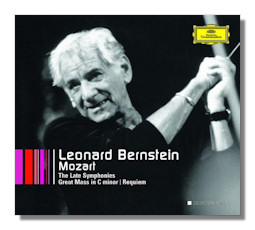
The Internet's Premier Classical Music Source
Related Links
- Mozart Reviews
- Latest Reviews
- More Reviews
-
By Composer
-
Collections
DVD & Blu-ray
Books
Concert Reviews
Articles/Interviews
Software
Audio
Search Amazon
Recommended Links
Site News
 CD Review
CD Review
Wolfgang Mozart

- Symphony #25 in G minor, K. 183
- Symphony #29 in A Major, K. 201
- Symphony #35 in D Major, K. 385 "Haffner"
- Symphony #36 in C Major, K. 425 "Linz"
- Symphony #38 in D Major, K. 504 "Prague"
- Symphony #39 in E Flat Major, K. 543
- Symphony #40 in G minor, K. 550
- Symphony #41 in C Major, K. 551 "Jupiter"
- Piano Concerto #15 in B Flat Major, K. 450 1
- Clarinet Concerto in A Major, K. 622 2
- Ave verum corpus, K. 618 6
- Exultate, jubilate, K. 165 3,6
- Great Mass in C minor, K. 427 4,6
- Requiem Mass in D minor, K. 626 5,6
1 Leonard Bernstein, piano
2 Peter Schmidl, clarinet
3,4 Arleen Auger, soprano
4 Frederica von Stade, mezzo-soprano
4 Frank Lopardo, tenor
4,5 Cornelius Hauptmann, bass
5 Marie McLaughlin, soprano
5 Marie Ewing, soprano
5 Jerry Hadley, tenor
6 Bavarian Radio Choir
6 Bavarian Radio Symphony Orchestra/Leonard Bernstein
Vienna Philharmonic Orchestra/Leonard Bernstein
Deutsche Grammophon 4776697 6CDs
These performances will hopefully appear in "The Leonard Bernstein Collection: Volume Two", but in the event that you don't need or want every scrap of Bernstein on the Yellow Label from composers M to Z, this is the best way to get Lenny's bighearted and surprisingly egoless Mozart recordings. Ranging from big and beefy (the symphonies in Vienna) to surprisingly plain in comparison (the concertos), this box holds much for the listener to enjoy.
When it came to Classical period repertoire, Bernstein was unpredictable. His early Haydn is generally excellent, his late Haydn good, not great. In Beethoven, late is generally preferable to early, save for perhaps the Symphony #5. In Mozart, late is almost universally better, both for the quality of the ensembles at hand, and for the far more mature insight that the aging Bernstein brought to these works. Well, mostly aging; this Piano Concerto #15 was recorded in 1966 and is a fine, if hardly essential reading. It appeared previously on Decca Legends, and was (is) in my mind undeserving of such accolades.
Everything else is mostly superb. Yes, the symphonies are really outdated in their broad tempi and big-band feel. They are also full of character and unapologetically warm. And broad doesn't always mean heavy; the earlier symphonies really go very well. Late Bernstein was often criticized for massive self-indulgence, but this set doesn't show that at all. In fact, while not matching his Haydn achievements on Columbia (now Sony), these performances arguably show Lenny at his best in Classical repertoire. Certainly he surpasses Karajan (on the same label) and Levine (on the same label, but also in Vienna). He does this by playing to the strengths of his orchestra and utilizing his own as an artist. While this isn't going to be for everyone, to my ears it is infinitely better than the period-instrument approach, which in the wrong hands makes this music very ugly.
Bernstein is never ugly. His Clarinet Concerto is standard issue, nothing special but very beautifully shaped by both soloist and orchestra. The late symphonies have long been admired, and it's nice to have them all here in one place. The sacred works are uniformly outstanding; the Great Mass and Requiem (here in Franz Beyer's version) are both free of mannerism or pomposity, and are frankly unexpected given the source. The Ave Verum Corpus wasn't really needed, but sounds lovely, while Arleen Auger simply shines in the Exultate, Jubilate. In short, this box shows the conductor at his best in a composer that took him years to truly understand. Aside from the concerto disc, each of these six albums is essential listening for Bernstein fans. If you don't plan on buy one of the mega-sets, purchase with confidence.
Copyright © 2014, Brian Wigman




















